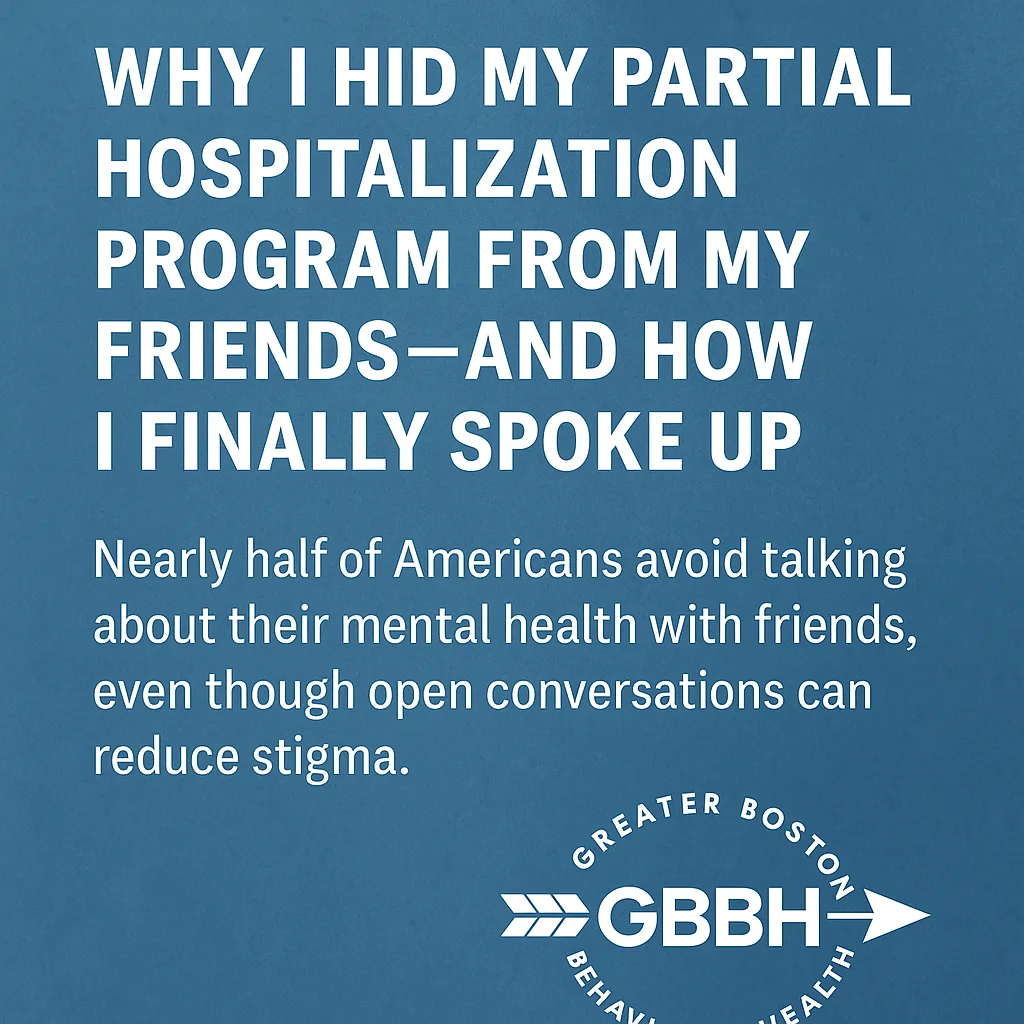I didn’t go into my partial hospitalization program planning to keep it a secret. In fact, I told myself I’d be open—own it, even. Mental health awareness is everywhere, right? Why should I feel ashamed?
But the first week hit me harder than I expected. Text messages went unanswered. I ignored calls. When friends asked how I was doing, I gave half-smiles and said, “Just taking it easy.” Inside, it felt like a silent collapse.
At Greater Boston Behavioral Health, we’ve seen this reaction time and time again—especially for people who are newly diagnosed and unsure how to talk about it. Hiding treatment is often the first response, but here’s what I learned: it doesn’t have to stay that way.
Why Hiding Your Partial Hospitalization Program Feels Safer (At First)
If you’re starting a partial hospitalization program in Boston, MA, chances are you’re dealing with more than just a diagnosis. You’re facing the ripple effect: the sudden shift in how you see yourself—and the fear of how others will see you.
The reasons to stay quiet are everywhere:
- Fear of judgment: Will my friends think I’m unstable?
- Fear of awkwardness: Will they pity me or act uncomfortable?
- Fear of distance: What if people pull away?
And, maybe the hardest: fear of confirming our worst belief—I’m broken.
For me, the fear wasn’t irrational. Boston is a close-knit city. I worried about seeing coworkers or acquaintances while heading into sessions. I worried my professional life would take a hit. I worried I’d lose parts of myself I worked hard to build.
But what I didn’t realize was that silence can be just as damaging as stigma. Silence feeds shame.
PHP Is a Stepping Stone, Not a Sentence
One thing that helped me change my view was learning what partial hospitalization actually means.
At Greater Boston Behavioral Health’s partial hospitalization program, we remind clients: PHP is intensive, yes, but it’s also temporary. It’s designed to stabilize you after a crisis or help you build tools before things spiral further. It’s not a forever label. It’s a short-term, high-support program to get you back to yourself—not to turn you into someone else.
I realized I wasn’t “becoming someone with a mental health problem.” I was someone already struggling who was finally choosing to get help.
When I Started Speaking Up, Something Changed
I didn’t make a Facebook announcement. I didn’t draft a big speech. It started with one friend. Someone I trusted. Someone who had always been in my corner.
I told them, honestly, “I’m in a program right now. It’s been a rough stretch, and I needed more support.”
What I got wasn’t pity—it was understanding. They asked good questions. They checked in more. They didn’t treat me like glass. And slowly, I found myself talking about it more openly, in ways that felt natural and safe.
If you’re reading this and feeling the weight of secrecy, here’s something to hold onto: The people who matter will want to understand you, not judge you.
How to Start Talking About PHP Without Feeling Exposed
Not everyone needs to know. You control your story. But hiding it from everyone can build walls that are hard to break down.
Here are strategies I used—and that we teach clients at Greater Boston Behavioral Health:
1. Choose Safe People
Start with someone you know will hold your story with care. This isn’t about broadcasting—it’s about connection.
2. Use Neutral, Empowering Language
You can say, “I’m working on my mental health,” or, “I’m in a program that helps with my anxiety.” You don’t need to list diagnoses or symptoms unless you want to.
3. Share When You Feel Ready, Not Rushed
Some people find it easier to text first. Others prefer in-person. Do what feels the least stressful.
4. Remember: This Is About You, Not Them
You’re not responsible for making others comfortable. You’re responsible for protecting your healing.
Partial Hospitalization Helped Me Rebuild—And My Circle Grew Stronger
The unexpected benefit of speaking up? My relationships got deeper. The friends who stuck around asked better questions, understood my boundaries, and knew how to support me in meaningful ways. The acquaintances who disappeared made room for healthier connections.
I learned that transparency can be a filter—it clears away the noise and leaves you surrounded by people who see you, not just your symptoms.
If you’re feeling stuck, isolated, or ashamed, we want you to know: this doesn’t have to be the whole story.
Greater Boston Behavioral Health’s partial hospitalization program in Boston isn’t just treatment—it’s a foundation for the next chapter of your life.
Whether you talk about it or not is your choice. But you deserve to know: there’s no shame in healing. If you’re near Boston, Dedham, Waltham, Needham Massachusetts, GBBH offers programs with that same approach.
Frequently Asked Questions About Partial Hospitalization Programs
What is a Partial Hospitalization Program (PHP)?
A partial hospitalization program is a structured, short-term treatment option that provides intensive mental health care during the day while allowing clients to return home at night. It’s designed for people who need more than weekly therapy but don’t require 24/7 inpatient care.
Who is PHP for?
PHP is ideal for individuals struggling with mental health issues like depression, anxiety, bipolar disorder, or trauma who need daily therapeutic support without full hospitalization. It’s especially helpful after a hospitalization or for those who need to prevent symptoms from worsening.
How long does a PHP last?
At Greater Boston Behavioral Health, most PHP programs run for several weeks, typically Monday through Friday, for around 6 hours per day. The exact duration depends on individual progress and clinical recommendations.
Can I work while in PHP?
Many clients take time off from work while in PHP to focus fully on their mental health. Some may work part-time or have flexible arrangements. Your treatment team can help you navigate these decisions.
Will anyone know I’m in PHP?
Only if you choose to tell them. Participation is confidential under HIPAA, and you have full control over who knows about your treatment.
What happens after PHP?
Most clients step down to an Intensive Outpatient Program (IOP) or outpatient therapy to maintain progress while reintegrating into daily life. Greater Boston Behavioral Health offers personalized aftercare planning to help you transition smoothly.
Ready to Talk?
Your story doesn’t end with a diagnosis—it begins with understanding yourself better. If you’re curious about partial hospitalization or just need to talk through your options, we’re here to help.
Call (888) 450-3097 or visit to learn more about our partial hospitalization program services in Boston, Massachusetts. You deserve support that meets you where you are—and helps you get where you want to go.


